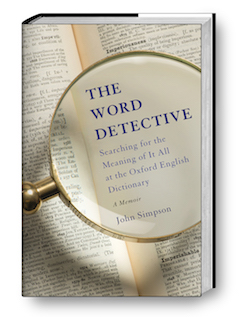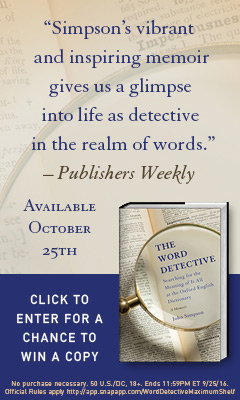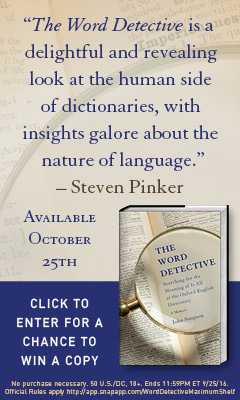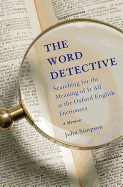The Word Detective: Searching for the Meaning of It All at the Oxford English Dictionary
by John Simpson
John Simpson is the former chief editor of the Oxford English Dictionary, where he oversaw the creation of the online edition--the first major reference book to make the leap from print to a digital format. His memoir, The Word Detective: Searching for the Meaning of It All at the Oxford English Dictionary, tells the story of a man, an institution, and how they both changed over time.
Simpson's career with the iconic dictionary began in 1976, when lexicographers still documented words, meanings and expressions on index cards (called "slips"), which were later analyzed as part of the process of writing or revising a dictionary entry. As an assistant on the Supplement to the OED, his first task was to read a work on the semiotics of film--part of a project to bring modern words and ideas into what remained at heart a Victorian enterprise. By the time he retired as the dictionary's chief editor in 2013, the OED had been transformed from a monument of Victorian scholarship to a dynamic on-line database--a revolution in which Simpson played a critical role.
Much of The Word Detective centers on this change, as told through the lens of Simpson's personal experience. At first, we learn about the traditional skills required for a lexicographer--how to "read" a text as research for the dictionary: a laborious word-by-word process that bears little resemblance to reading for pleasure or instruction. How to write a definition, with all its related words and sub-meanings. How a new word earns a place in the dictionary. And, in the case of a charming extended history of the word "f*ck" and its first appearance in the OED Supplement, how new editorial policies develop to reflect a changing world.
The questions and skills under consideration changed when the OED staff took the initial steps into first digitizing the dictionary as a CD-ROM and later creating an online version. Some of the questions were technical, such as how to transfer data from print into new technologies. But other questions involved reconceptualizing both the format of the dictionary and how its editors worked with new resources. Suddenly in the vanguard of new ways of studying language, editors had to consider ways to radically restructure information, how to best utilize new search and display capacities, and how newly digitized databases opened the process of identifying early word uses. Caught up in the wave of change, Simpson never entirely loses track of the OED's roots and offers one example of why those databases can never completely replace the lexicographer's need to do archival research and verification. When his instincts tell him the quotation evidence for an early meaning of "pal" doesn't add up, he hits the road to track the example to its original source in an obscure document in a minor archive, where the word proved not to be "pal", but "Poll"--a nickname for Mary.
Some of the most engaging portions of the book stand outside the larger narrative. Brief essays on the history and meanings of individual words used in the text are highlighted by using in a different font. Some, like the essays on "serendipity," "apprenticeship" and "disability" reflect the arc of Simpson's personal story. Others--"on-line," "launch" and "project" for example--are drawn from the larger story of the dictionary's transformation. A few, most notably "selfie", represent a moment in time--though Simpson also uses "selfie" to illustrate the "truism known only to lexicographers" that all new words are at least 10 years older than we think they are. Many words seem to be chosen for their intrinsic interest rather than any larger thematic issue. In addition to describing the history of an individual word, each makes a different point about how words work, ways to think about language, or how a lexicographer works.
In less skillful hands, The Word Detective might have been a book for lexicographers and computer geeks. Instead, Simpson, writing with a wry and often self-deprecating wit and an obvious passion for his subject, tells a story that is at once deeply personal and part of the larger story of a fundamental shift in how we share information.
The Word Detective will inevitably invite comparisons to Simon Winchester's popular histories of the Oxford English Dictionary, The Professor and the Madman and The Meaning of Everything. In fact, Simpson's subtitle, Searching for the Meaning of It All at the Oxford English Dictionary, seems to demand such comparisons. At one level, The Word Detective continues the story where Winchester left off, telling the story of how the culture of the dictionary shifted from its Victorian roots to the digital age. But its heart is the unexpected excitement of historical dictionary work: finding lost information about a word, and consequently about the people and culture that used it.
Ultimately, The Word Detective is an education in a way of thinking about language that is unfamiliar to most of us. --Pamela Toler








.jpeg)